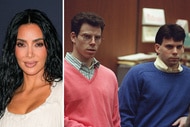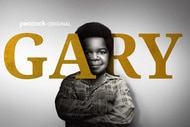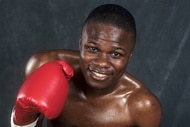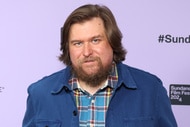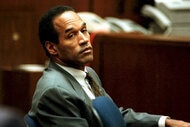Create a free profile to get unlimited access to exclusive videos, breaking news, sweepstakes, and more!
‘Banished’ Shines Light On ‘Completely Infantilized’ Prince Andrew
In 'Banished,' royal experts discuss how Queen Elizabeth's affection for Prince Andrew influenced his relationship with convicted sex offender Jeffrey Epstein.

It’s fair to say that, as Queen Elizabeth’s second born son, Prince Andrew isn’t considered the most important member of the royal family.
Truthfully, the young prince was only relevant, in terms of the royal hierarchy, in the unlikely event that Prince Charles — now King Charles — died, making him next in line to the throne. However, as Andrew would eventually learn, his “life was to be one of descending importance because the heir had a son, William, who gave birth to three children. And down, down, down he went,” Majesty Magazine Editor-In-Chief Ingrid Seward said in the Peacock documentary “Banished: Prince Andrew,” which chronicles the prince’s fall from grace.
Of course, he was loved by his own family, especially by Queen Elizabeth and Prince Philip. But he still sought approval from the public. “We have this very needy Andrew, who was looking to feel important,” Editor-At-Large Helen Kirwan-Taylor said.
That yearning for a sense of importance may have been fulfilled by convicted sex-offender Jeffrey Epstein and his longtime acquaintance Ghislaine Maxwell, royal observers noted in “Banished.”
RELATED: Why Prince Andrew Should Be Worried After The Ghislaine Maxwell Verdict
“When he was with Epstein, he felt he was the center of attention, that he was a part of the big time, at last, which he never felt when he was in England,” Tina Brown, author of “The Palace Papers,” said.
Brown noted this friendship was a disappointment to many, saying, “It’s sad when you see the pathetic figure that we see today. There was a moment of promise with him.”
She’s referring to Prince Andrew’s time fighting in the Falklands War between Great Britain and Argentina in 1982, which earned the royal much respect among the public. His service was followed by his 1986 wedding to Sarah Ferguson, a longtime acquaintance of the prince, whom she showered with affection. “He just loved every bit of attention he got,” Kirwan-Taylor said.
But his time in the spotlight was short-lived as the couple ultimately divorced after Ferguson was photographed kissing another man, an event that caused great embarrassment to the royal family. “Here she was, this young bride stuck in this gloomy marriage. She was miserable and forlorn, and quickly started acting out,” Brown said of Ferguson.
The divorce was one of many events that reflected poorly on Andrew, whose once shining star began to fade. “The collapse of the marriage to Sarah Ferguson was a disaster in terms of both their reputations,” Brown said, adding that people began to see through the façade.
Brown described Prince Andrew, who used to be called a womanizer, as largely dependent on his mother and her purse, saying, “He’s completely infantilized.”
Paul Page, a former royal protection officer, revealed the Prince even had a collection of about 50 or 60 teddy bears in his private apartment at Buckingham Palace. "I thought for a 41-year-old man that was a bit odd,” Page said, adding that the prince took his collection very seriously. "If the teddy bears aren’t put back in that order, Prince Andrew would shout and scream at the maids, so they took a picture to make sure they get it right.”
As reports of what Brown described as “oafish and rude behavior” emerged, Prince Andrew lost his role as U.K.’s special envoy, giving him more time to date and party.
“We used to joke that he should have a revolving door in his bedroom, the amount of women going in and out of there,” Page said. “Different women every time.”
And while the press might’ve ignored other royals’ indiscretions, Kirwan-Taylor said they wouldn’t do that for him because “nobody loves Prince Andrew.”
“The young playboy prince became this sour, middle-aged man, who was rude, upset people,” journalist Annette Witheridge said, a notion that was seconded by Page, who called the royal a “bully.”
Brown suggested that the prince became so bitter because of his ever-descending status in the line of succession. “He was a side-show. He wasn’t rich enough. He wasn’t the heir to the throne,” she said.
Prince Andrew’s reputation reached an all-time low following the suicide of Jeffrey Epstein, when the royal decided to speak out in a November 2019 interview with the BBC in which he defended their friendship and denied sexually assaulting Virginia Roberts Giuffre, who has claimed she was sex trafficked by Epstein and Maxwell as a teen. “His decision to do that interview was the most unbelievable, self-destructive decision you could possibly make. Andrew strapped on the suicide vest and sat down with one of the most forensic interviewers,” Brown said.
Despite the backlash to the interview, the Queen continued to support her son, even going horseback riding with him shortly after. “She’s not an idiot at all. She did it to support him and she decided to believe what her son told her,” Seward said.
But eventually, the Queen had to put her foot down, demoting Prince Andrew from his role as a public member of the royal family and stripping him of his military and royal titles the same month as his interview. “To her, the institution is more important than safeguarding some of the stupid things that your children have done,” former royal secretary Dickie Arbiter said. “That’s very difficult for a mother to do.”
Prince Andrew went on to settle a sexual assault lawsuit with Roberts Giuffre out of court in February 2022. “Prince Andrew has never intended to malign Ms. Giuffre’s character, and he accepts that she has suffered both as an established victim of abuse and as a result of unfair public attacks,” read a joint statement from both parties previously obtained by Oxygen.com.
“It’s important to remember that Prince Andrew is not a victim. I think he’d like us to think he’s a victim, but he was a very active participant in his own demise. Not only did he make bad choices, but morally questionable choices and only he is to blame for his own behavior,” Kirwan-Taylor said.
To hear more from the royal experts, watch “Banished: Prince Andrew” on Peacock.



